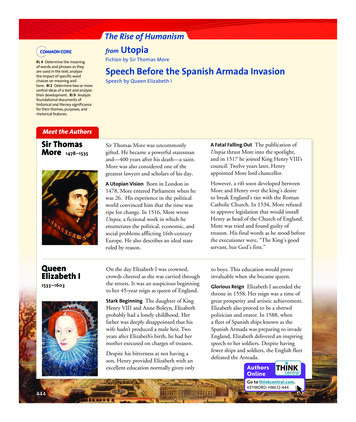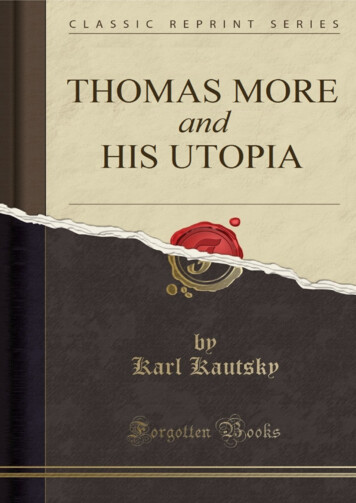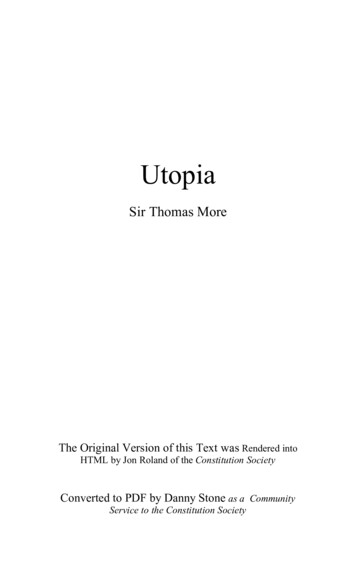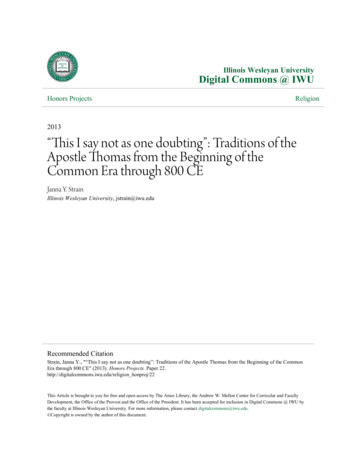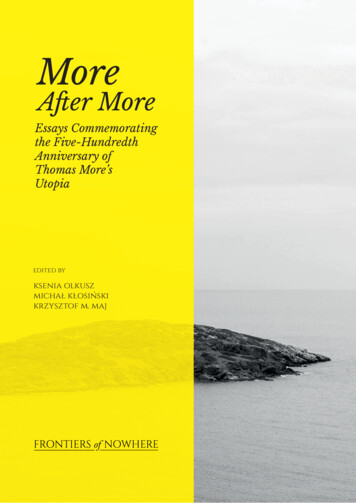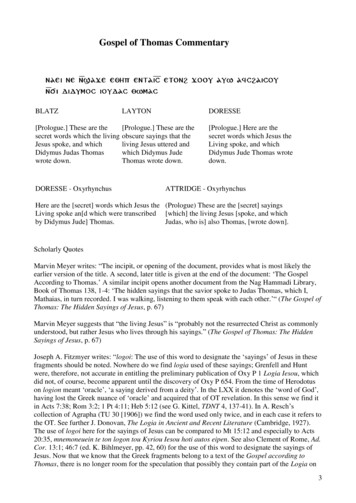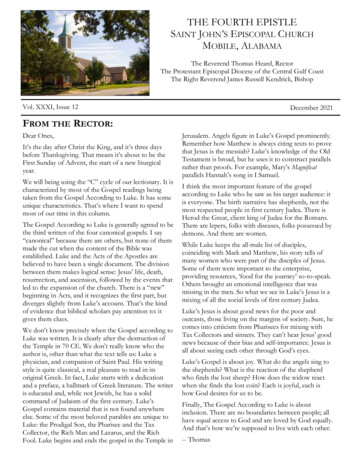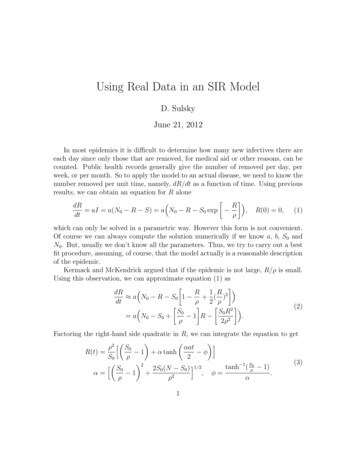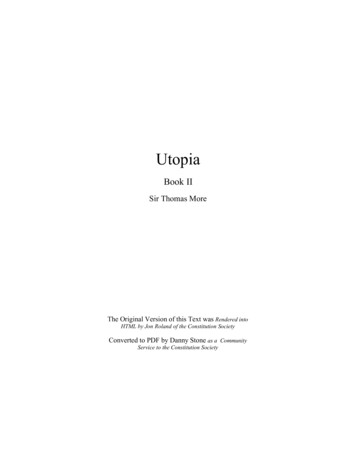
Transcription
UtopiaBook IISir Thomas MoreThe Original Version of this Text was Rendered intoHTML by Jon Roland of the Constitution SocietyConverted to PDF by Danny Stone as a CommunityService to the Constitution Society
Utopia – Book II1Sir Thomas MoreBOOK IITHE island of Utopia is in the middle 200 miles broad,and holds almost at the same breadth over a great partof it; but it grows narrower toward both ends. Itsfigure is not unlike a crescent: between its horns, the seacomes in eleven miles broad, and spreads itself into a greatbay, which is environed with land to the compass of about500 miles, and is well secured from winds. In this bay there isno great current; the whole coast is, as it were, one continuedharbor, which gives all that live in the island greatconvenience for mutual commerce; but the entry into the bay,occasioned by rocks on the one hand, and shallows on theother, is very dangerous. In the middle of it there is onesingle rock which appears above water, and may therefore beeasily avoided, and on the top of it there is a tower in which agarrison is kept; the other rocks lie under water, and are verydangerous. The channel is known only to the natives, so thatif any stranger should enter into the bay, without one of theirpilots, he would run great danger of shipwreck; for even theythemselves could not pass it safe, if some marks that are onthe coast did not direct their way; and if these should be but alittle shifted, any fleet that might come against them, howgreat soever it were, would be certainly lost.On the other side of the island there are likewise manyharbors; and the coast is so fortified, both by nature and art,that a small number of men can hinder the descent of a greatarmy. But they report (and there remain good marks of it tomake it credible) that this was no island at first, but a part ofthe continent. Utopus that conquered it (whose name it stillcarries, for Abraxa was its first name) brought the rude anduncivilized inhabitants into such a good government, and tothat measure of politeness, that they now far excel all the restof mankind; having soon subdued them, he designed toseparate them from the continent, and to bring the sea quiteround them. To accomplish this, he ordered a deep channel tobe dug fifteen miles long; and that the natives might not think
Utopia – Book II2Sir Thomas Morehe treated them like slaves, he not only forced the inhabitants,but also his own soldiers, to labor in carrying it on. As he seta vast number of men to work, he beyond all men'sexpectations brought it to a speedy conclusion. And hisneighbors who at first laughed at the folly of the undertaking,no sooner saw it brought to perfection than they were struckwith admiration and terror.There are fifty-four cities in the island, all large and wellbuilt: the manners, customs, and laws of which are the same,and they are all contrived as near in the same manner as theground on which they stand will allow. The nearest lie atleast twenty-four miles distance from one another, and themost remote are not so far distant but that a man can go onfoot in one day from it to that which lies next it. Every citysends three of its wisest Senators once a year to Amaurot, toconsult about their common concerns; for that is the chieftown of the island, being situated near the centre of it, so thatit is the most convenient place for their assemblies. Thejurisdiction of every city extends at least twenty miles: andwhere the towns lie wider, they have much more ground: notown desires to enlarge its bounds, for the people considerthemselves rather as tenants than landlords. They have builtover all the country, farmhouses for husbandmen, which arewell contrived, and are furnished with all things necessary forcountry labor. Inhabitants are sent by turns from the cities todwell in them; no country family has fewer than forty menand women in it, besides two slaves. There is a master and amistress set over every family; and over thirty families thereis a magistrate.Every year twenty of this family come back to the town,after they have stayed two years in the country; and in theirroom there are other twenty sent from the town, that they maylearn country work from those that have been already oneyear in the country, as they must teach those that come tothem the next from the town. By this means such as dwell inthose country farms are never ignorant of agriculture, and socommit no errors, which might otherwise be fatal, and bringthem under a scarcity of corn. But though there is every year
Utopia – Book II3Sir Thomas Moresuch a shifting of the husbandmen, to prevent any man beingforced against his will to follow that hard course of life toolong, yet many among them take such pleasure in it that theydesire leave to continue in it many years. These husbandmentill the ground, breed cattle, hew wood, and convey it to thetowns, either by land or water, as is most convenient. Theybreed an infinite multitude of chickens in a very curiousmanner; for the hens do not sit and hatch them, but vastnumbers of eggs are laid in a gentle and equal heat, in orderto be hatched, and they are no sooner out of the shell, andable to stir about, but they seem to consider those that feedthem as their mothers, and follow them as other chickens dothe hen that hatched them.They breed very few horses, but those they have are full ofmettle, and are kept only for exercising their youth in the artof sitting and riding them; for they do not put them to anywork, either of ploughing or carriage, in which they employoxen; for though their horses are stronger, yet they find oxencan hold out longer; and as they are not subject to so manydiseases, so they are kept upon a less charge, and with lesstrouble; and even when they are so worn out, that they are nomore fit for labor, they are good meat at last. They sow nocorn, but that which is to be their bread; for they drink eitherwine, cider, or perry, and often water, sometimes boiled withhoney or licorice, with which they abound; and though theyknow exactly how much corn will serve every town, and allthat tract of country which belongs to it, yet they sow muchmore, and breed more cattle than are necessary for theirconsumption; and they give that overplus of which they makeno use to their neighbors. When they want anything in thecountry which it does not produce, they fetch that from thetown, without carrying anything in exchange for it. And themagistrates of the town take care to see it given them; forthey meet generally in the town once a month, upon a festivalday. When the time of harvest comes, the magistrates in thecountry send to those in the towns, and let them know howmany hands they will need for reaping the harvest; and thenumber they call for being sent to them, they commonly
Utopia – Book IIdespatch it all in one day.4Sir Thomas More
Utopia – Book II5Sir Thomas MoreChapter 1HOf Their Towns, Particularly of AmaurotE that knows one of their towns knows them all,they are so like one another, except where thesituation makes some difference. I shall thereforedescribe one of them; and none is so proper as Amaurot; foras none is more eminent, all the rest yielding in precedence tothis, because it is the seat of their Supreme Council, so therewas none of them better known to me, I having lived fiveyears altogether in it.It lies upon the side of a hill, or rather a rising ground: itsfigure is almost square, for from the one side of it, whichshoots up almost to the top of the hill, it runs down in adescent for two miles to the river Anider; but it is a littlebroader the other way that runs along by the bank of thatriver. The Anider rises about eighty miles above Amaurot, ina small spring at first, but other brooks falling into it, ofwhich two are more considerable than the rest. As it runs byAmaurot, it is grown half a mile broad; but it still growslarger and larger, till after sixty miles course below it, it islost in the ocean, between the town and the sea, and for somemiles above the town, it ebbs and flows every six hours, witha strong current. The tide comes up for about thirty miles sofull that there is nothing but salt water in the river, the freshwater being driven back with its force; and above that, forsome miles, the water is brackish; but a little higher, as it runsby the town, it is quite fresh; and when the tide ebbs, itcontinues fresh all along to the sea. There is a bridge castover the river, not of timber, but of fair stone, consisting ofmany stately arches; it lies at that part of the town which isfarthest from the sea, so that ships without any hinderance lieall along the side of the town.There is likewise another river that runs by it, which,though it is not great, yet it runs pleasantly, for it rises out ofthe same hill on which the town stands, and so runs downthrough it, and falls into the Anider. The inhabitants have
Utopia – Book II6Sir Thomas Morefortified the fountain-head of this river, which springs a littlewithout the town; so that if they should happen to bebesieged, the enemy might not be able to stop or divert thecourse of the water, nor poison it; from thence it is carried inearthen pipes to the lower streets; and for those places of thetown to which the water of that shall river cannot beconveyed, they have great cisterns for receiving the rainwater, which supplies the want of the other. The town iscormpassed with a high and thick wall, in which there aremany towers and forts; there is also a broad and deep dryditch, set thick with thorns, cast round three sides of thetown, and the river is instead of a ditch on the fourth side.The streets are very convenient for all carriage, and are wellsheltered from the winds. Their buildings are good, and areso uniform that a whole side of a street looks like one house.The streets are twenty feet broad; there lie gardens behind alltheir houses; these are large but enclosed with buildings thaton all hands face the streets; so that every house has both adoor to the street, and a back door to the garden. Their doorshave all two leaves, which, as they are easily opened, so theyshut of their own accord; and there being no property amongthem, every man may freely enter into any house whatsoever.At every ten years' end they shift their houses by lots.They cultivate their gardens with great care, so that theyhave vines, fruits, herbs, and flowers in them; and all is sowell ordered, and so finely kept, that I never saw gardensanywhere that were both so fruitful and so beautiful as theirs.And this humor of ordering their gardens so well is not onlykept up by the pleasure they find in it, but also by anemulation between the inhabitants of the several streets, whovie with each other; and there is indeed nothing belonging tothe whole town that is both more useful and more pleasant.So that he who founded the town seems to have taken care ofnothing more than of their gardens; for they say, the wholescheme of the town was designed at first by Utopus, but heleft all that belonged to the ornament and improvement of itto be added by those that should come after him, that beingtoo much for one man to bring to perfection. Their records,
Utopia – Book II7Sir Thomas Morethat contain the history of their town and State, are preservedwith an exact care, and run backward 1,760 years. From theseit appears that their houses were at first low and mean, likecottages, made of any sort of timber, and were built with mudwalls and thatched with straw. But now their houses are threestories high: the fronts of them are faced with stone,plastering, or brick; and between the facings of their wallsthey throw in their rubbish. Their roofs are flat, and on themthey lay a sort of plaster, which costs very little, and yet is sotempered that it is not apt to take fire, and yet resists theweather more than lead. They have great quantities of glassamong them, with which they glaze their windows. They usealso in their windows a thin linen cloth, that is so oiled orgummed that it both keeps out the wind and gives freeadmission to the light.
Utopia – Book II8Sir Thomas MoreChapter 2Of Their MagistratesTHIRTY families choose every year a magistrate, whowas anciently called the syphogrant, but is now calledthe philarch; and over every ten syphogrants, with thefamilies subject to them, there is another magistrate, who wasanciently called the tranibor, but of late the archphilarch. Allthe syphogrants, who are in number 200, choose the Princeout of a list of four, who are named by the people of the fourdivisions of the city; but they take an oath before theyproceed to an election, that they will choose him whom theythink most fit for the office. They give their voices secretly,so that it is not known for whom everyone gives his suffrage.The Prince is for life, unless he is removed upon suspicion ofsome design to enslave the people. The tranibors are newchosen every year, but yet they are for the most partcontinued. All their other magistrates are only annual. Thetranibors meet every third day, and oftener if necessary, andconsult with the prince, either concerning the affairs of theState in general or such private differences as may arisesometimes among the people; though that falls out butseldom. There are always two syphogrants called into thecouncil-chamber, and these are changed every day. It is afundamental rule of their government that no conclusion canbe made in anything that relates to the public till it has beenfirst debated three several days in their Council. It is deathfor any to meet and consult concerning the State, unless it beeither in their ordinary Council, or in the assembly of thewhole body of the people.These things have been so provided among them, that theprince and the tranibors may not conspire together to changethe government and enslave the people; and therefore whenanything of great importance is set on foot, it is sent to thesyphogrants; who after they have communicated it to thefamilies that belong to their divisions, and have considered itamong themselves, make report to the Senate; and upon great
Utopia – Book II9Sir Thomas Moreoccasions, the matter is referred to the Council of the wholeisland. One rule observed in their Council, is, never to debatea thing on the same day in which it is first proposed; for thatis always referred to the next meeting, that so men may notrashly, and in the heat of discourse, engage themselves toosoon, which might bias them so much, that instead ofconsulting the good of the public, they might rather study tosupport their first opinions, and by a perverse andpreposterous sort of shame, hazard their country rather thanendanger their own reputation, or venture the being suspectedto have wanted foresight in the expedients that they at firstproposed. And therefore to prevent this, they take care thatthey may rather be deliberate than sudden in their motions.
Utopia – Book II10Sir Thomas MoreChapter 3Of Their Trades, and Manner of LifeAGRICULTURE is that which is so universallyunderstood among them that no person, either manor woman, is ignorant of it; they are instructed in itfrom their childhood, partly by what they learn at school andpartly by practice; they being led out often into the fields,about the town, where they not only see others at work, butare likewise exercised in it themselves. Besides agriculture,which is so common to them all, every man has somepeculiar trade to which he applies himself, such as themanufacture of wool, or flax, masonry, smith's work, orcarpenter's work; for there is no sort of trade that is not ingreat esteem among them. Throughout the island they wearthe same sort of clothes without any other distinction, exceptwhat is necessary to distinguish the two sexes, and themarried and unmarried. The fashion never alters; and as it isneither disagreeable nor uneasy, so it is suited to the climate,and calculated both for their summers and winters. Everyfamily makes their own clothes; but all among them, womenas well as men, learn one or other of the trades formerlymentioned. Women, for the most part, deal in wool and flax,which suit best with their weakness, leaving the ruder tradesto the men. The same trade generally passes down fromfather to son, inclinations often following descent; but if anyman's genius lies another way, he is by adoption translatedinto a family that deals in the trade to which he is inclined:and when that is to be done, care is taken not only by hisfather, but by the magistrate, that he may be put to a discreetand good man. And if after a person has learned one trade, hedesires to acquire another, that is also allowed, and ismanaged in the same manner as the former. When he haslearned both, he follows that which he likes best, unless thepublic has more occasion for the other.The chief, and almost the only business of thesyphogrants, is to take care that no man may live idle, but
Utopia – Book II11Sir Thomas Morethat every one may follow his trade diligently: yet they do notwear themselves out with perpetual toil, from morning tonight, as if they were beasts of burden, which, as it is indeeda heavy slavery, so it is everywhere the common course oflife among all mechanics except the Utopians; but theydividing the day and night into twenty-four hours, appoint sixof these for work; three of which are before dinner, and threeafter. They then sup, and at eight o'clock, counting fromnoon, go to bed and sleep eight hours. The rest of their timebesides that taken up in work, eating and sleeping, is left toevery man's discretion; yet they are not to abuse that intervalto luxury and idleness, but must employ it in some properexercise according to their various inclinations, which is forthe most part reading. It is ordinary to have public lecturesevery morning before daybreak; at which none are obliged toappear but those who are marked out for literature; yet agreat many, both men and women of all ranks, go to hearlectures of one sort of other, according to their inclinations.But if others, that are not made for contemplation, chooserather to employ themselves at that time in their trades, asmany of them do, they are not hindered, but are rathercommended, as men that take care to serve their country.After supper, they spend an hour in some diversion, insummer in their gardens, and in winter in the halls where theyeat; where they entertain each other, either with music ordiscourse. They do not so much as know dice, or any suchfoolish and mischievous games: they have, however, twosorts of games not unlike our chess; the one is betweenseveral numbers, in which one number, as it were, consumesanother: the other resembles a battle between the virtues andthe vices, in which the enmity in the vices among themselves,and their agreement against virtue, is not unpleasantlyrepresented; together with the special oppositions betweenthe particular virtues and vices; as also the methods by whichvice either openly assaults or secretly undermines virtue, andvirtue on the other hand resists it. But the time appointed forlabor is to be narrowly examined, otherwise you mayimagine, that since there are only six hours appointed for
Utopia – Book II12Sir Thomas Morework, they may fall under a scarcity of necessary provisions.But it is so far from being true, that this time is not sufficientfor supplying them with plenty of all things, either necessaryor convenient, that it is rather too much; and this you willeasily apprehend, if you consider how great a part of all othernations is quite idle.First, women generally do little, who are the half ofmankind; and if some few women are diligent, their husbandsare idle: then consider the great company of idle priests, andof those that are called religious men; add to these all richmen, chiefly those that have estates in land, who are callednoblemen and gentlemen, together with their families, madeup of idle persons, that are kept more for show than use; addto these, all those strong and lusty beggars, that go aboutpretending some disease, in excuse for their begging; andupon the whole account you will find that the number ofthose by whose labors mankind is supplied, is much less thanyou perhaps imagined. Then consider how few of those thatwork are employed in labors that are of real service; for wewho measure all things by money, give rise to many tradesthat are both vain and superfluous, and serve only to supportriot and luxury. For if those who work were employed only insuch things as the conveniences of life require, there wouldbe such an abundance of them that the prices of them wouldso sink that tradesmen could not be maintained by their gains;if all those who labor about useless things were set to moreprofitable employments, and if all they that languish out theirlives in sloth and idleness, every one of whom consumes asmuch as any two of the men that are at work, were forced tolabor, you may easily imagine that a small proportion of timewould serve for doing all that is either necessary, profitable,or pleasant to mankind, especially while pleasure is keptwithin its due bounds.This appears very plainly in Utopia, for there, in a greatcity, and in all the territory that lies round it, you can scarcefind 500, either men or women, by their age and strength, arecapable of labor, that are not engaged in it; even thesyphogrants, though excused by the law, yet do not excuse
Utopia – Book II13Sir Thomas Morethemselves, but work, that by their examples they may excitethe industry of the rest of the people. The like exemption isallowed to those who, being recommended to the people bythe priests, are by the secret suffrages of the syphograntsprivileged from labor, that they may apply themselves whollyto study; and if any of these fall short of those hopes that theyseemed at first to give, they are obliged to return to work.And sometimes a mechanic, that so employs his leisurehours, as to make a considerable advancement in learning, iseased from being a tradesman, and ranked among theirlearned men. Out of these they choose their ambassadors,their priests, their tranibors, and the prince himself, ancientlycalled their Barzenes, but is called of late their Ademus.And thus from the great numbers among them that areneither suffered to be idle, nor to be employed in any fruitlesslabor, you may easily make the estimate how much may bedone in those few hours in which they are obliged to labor.But besides all that has been already said, it is to beconsidered that the needful arts among them are managedwith less labor than anywhere else. The building or therepairing of houses among us employ many hands, becauseoften a thriftless heir suffers a house that his father built tofall into decay, so that his successor must, at a great cost,repair that which he might have kept up with a small charge:it frequently happens that the same house which one personbuilt at a vast expense is neglected by another, who thinks hehas a more delicate sense of the beauties of architecture; andhe suffering it to fall to ruin, builds another at no less charge.But among the Utopians all things are so regulated that menvery seldom build upon a new piece of ground; and are notonly very quick in repairing their houses, but show theirforesight in preventing their decay: so that their buildlngs arepreserved very long, with but little labor, and thus thebuilders to whom that care belongs are often withoutemployment, except the hewing of timber and the squaring ofstones, that the materials may be in readiness for raising abuilding very suddenly when there is any occasion for it.As to their clothes, observe how little work is spent in
Utopia – Book II14Sir Thomas Morethem: while they are at labor, they are clothed with leatherand skins. cast carelessly about them, which will last sevenyears; and when they appear in public they put on an uppergarment, which hides the other; and these are all of one color,and that is the natural color of the wool. As they need lesswoollen cloth than is used anywhere else, so that which theymake use of is much less costly. They use linen cloth more;but that is prepared with less labor, and they value cloth onlyby the whiteness of the linen or the cleanness of the wool,without much regard to the fineness of the thread: while inother places, four or five upper garments of woollen cloth, ofdifferent colors, and as many vests of silk, will scarce serveone man; and while those that are nicer think ten are too few,every man there is content with one, which very often serveshim two years. Nor is there anything that can tempt a man todesire more; for if he had them, he would neither be thewarmer nor would he make one jot the better appearance forit. And thus, since they are all employed in some useful labor,and since they content themselves with fewer things, it fallsout that there is a great abundance of all things among them:so that it frequently happens that, for want of other work, vastnumbers are sent out to mend the highways. But when nopublic undertaking is to be performed, the hours of workingare lessened. The magistrates never engage the people inunnecessary labor, since the chief end of the constitution is toregulate labor by the necessities of the public, and to allowall the people as much time as is necessary for theimprovement of their minds, in which they think thehappiness of life consists.
Utopia – Book II15Sir Thomas MoreChapter 4Of Their TrafficBUT it is now time to explain to you the mutualintercourse of this people, their commerce, and therules by which all things are distributed among them.As their cities are composed of families, so their familiesare made up of those that are nearly related to one another.Their women, when they grow up, are married out; but all themales, both children and grandchildren, live still in the samehouse, in great obedience to their common parent, unless agehas weakened his understanding: and in that case, he that isnext to him in age comes in his room. But lest any city shouldbecome either too great, or by any accident be dispeopled,provision is made that none of their cities may contain above6,000 families, besides those of the country round it. Nofamily may have less than ten and more than sixteen personsin it; but there can be no determined number for the childrenunder age. This rule is easily observed, by removing some ofthe children of a more fruitful couple to any other family thatdoes not abound so much in them.By the same rule, they supply cities that do not increase sofast, from others that breed faster; and if there is any increaseover the whole island, then they draw out a number of theircitizens out of the several towns, and send them over to theneighboring continent; where, if they find that the inhabitantshave more soil than they can well cultivate, they fix a colony,taking the inhabitants into their society, if they are willing tolive with them; and where they do that of their own accord,they quickly enter into their method of life, and conform totheir rules, and this proves a happiness to both nations; foraccording to their constitution, such care is taken of the soilthat it becomes fruitful enough for both, though it might beotherwise too narrow and barren for any one of them. But ifthe natives refuse to conform themselves to their laws, theydrive them out of those bounds which they mark out forthemselves, and use force if they resist. For they account it a
Utopia – Book II16Sir Thomas Morevery just cause of war, for a nation to hinder others frompossessing a part of that soil of which they make no use, butwhich is suffered to lie idle and uncultivated; since everyman has by the law of nature a right to such a waste portionof the earth as is necessary for his subsistence. If an accidenthas so lessened the number of the inhabitants of any of theirtowns that it cannot be made up from the other towns of theisland, without diminishing them too much, which is said tohave fallen out but twice since they were first a people, whengreat numbers were carried off by the plague, the loss is thensupplied by recalling as many as are wanted from theircolonies; for they will abandon these, rather than suffer thetowns in the island to sink too low.But to return to their manner of living in society, theoldest man of every family, as has been already said, is itsgovernor. Wives serve their husbands, and children theirparents, and always the younger serves the elder. Every cityis divided into four equal parts, and in the middle of eachthere is a marketplace: what is brought thither, andmanufactured by the several families, is carried from thenceto houses appointed for that purpose, in which all things of asort are laid by themselves; and thither every father goes andtakes whatsoever he or his family stand in need of, withouteither paying for it or leaving anything in exchange. There isno reason for giving a denial to any person, since there issuch plenty of everything among them; and there is no dangerof a man's asking for more than he needs; they have noinducements to do this, since they are sure that they shallalways be supplied. It is the fear of want that makes any ofthe whole race of animals either greedy or ravenous; butbesides fear, there is in man a pride that makes him fancy it aparticular glory to excel others in pomp and excess. But bythe laws of the Utopians, there is no room for this. Near thesemarkets there are others for all sorts of provisions, wherethere are not only herbs, fruits, and bread, but also fish, fowl,and cattle.There are also, without their towns, places appointed nearsome running water, for killing their beasts, and for washing
Utopia – Book II17Sir Thomas Moreaway their filth, which is done by their slaves: for they suffernone of their citizens to kill their cattle, because they thinkthat pity and good-nature, which are among the best of thoseaffections that are born with us, are
Converted to PDF by Danny Stone as a Community Service to the Constitution Society. Utopia – Book II 1 Sir Thomas More BOOK II HE island of Utopia is in the middle 200 miles broad, an
